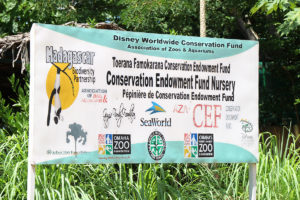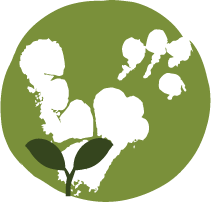Reforestation Projects
Madagascar’s stunning wildife has adapted to the diverse array of ecosystems on the island from arid and spiny forests to dense, humid jungles. With habitat loss due to the activity of humans, Madagascar’s lemur species have become the world’s most threatened group of mammals. As a means of restoring the relationship between the people and the natural environment, Madagascar Biodiversity Partnership (MBP) has implemented several community-based conservation and development programs.
Education Promoting Reforestation Program (EPRP)

The EPRP focuses on the diet of the Critically Endangered black-and-white ruffed lemur, which eats fruit whole and then passes the seeds unharmed. The MBP and Omaha’s Henry Doorly Zoo & Aquarium (OHDZA) discovered that seeds collected from poop grow better than “unprocessed” seeds. In this unique reforestation project, seeds are used from the lemur feces to rebuild a lemur-friendly forest. The MBP and OHDZA and their partners are not only planting the lemurs’ favorite seeds, but also timber and fruiting trees closer to the villages to provide additional food and income.
Under the EPRP, MBP and OHDZA personnel and graduate students track the lemurs through the forest, collect their poop, and plant the seeds in nurseries. The seedlings are transplanted as part of a community-supported reforestation program in an effort to restore Kianjavato’s damaged forests. More than 1,776 people in Kianjavato Commune (a commune includes multiple villages) participate in weekly planting events that are conducted twice a week.
Utilizing this field-tested methodology, MBP, OHDZA and Conservation Fusion, Inc. (an international educational NGO) are initiating EPRP’s in additional regions of Madagascar from the arid south to the seasonally dry far north with the help of other seed-dispersing lemurs and eager community participants. This work is coupled with intense community education and outreach efforts that integrate alternative agricultural practices, resource conservation and entrepreneurial opportunities.
Lemurs: Vital Reforestation Partners
By using the seeds from the fruit that the black-and-white ruffed lemur loves to eat, we are ensuring that our reforested area will have the tree species that are important to the lemurs. When these new trees are old enough to start producing fruit, this will entice the lemurs to venture into these reforested areas. And as seed disperses, the lemurs will continue to help supply the new forest with more trees.
Reforestation for the Community
The MBP has expanded the EPRP to benefit Kianjavato’s community by including commercial trees (like ebony, mango, coffee and banana) as part of the reforestation program. These trees provide community members additional income. The MBP hopes that by teaching the community how to plant and grow their own trees, they will have a greater sense of pride toward the unique flora that surround them.
Nurseries
Each tree grown for the reforestation project begins as a seedling requiring care and protection within a nursery before being planted. These nurseries are a temporary housing for a forest of over one million trees. The trees have to be nurtured to maturity by those of the local community and the MBP. In addition to the 8 nurseries located in Kianjavato, we are building 10 more satellite nurseries to increase the number of trees planted per month.



Conservation Credit Rewards Program

In 2012, OHDZA-MBP initiated a Conservation Credit Rewards (CCR) program to encourage participation at community planting events. This program rewards local Malagasy schools, families and individuals who participate in tree-planting day events with a variety of items. Incentive items were selected for their potential to improve the standard of living while reducing people’s burden on local forests. This program strives to balance community-identified needs with that of local critically endangered wildlife. For every tree planted by a participant, the MBP gives them credit to be accumulated to earn sustainable, green, life-changing tools like solar kits, rocket stoves, bicycles, sewing machines and Hippo Rollers. By having Conservation Credit participants earn and save their credits to “purchase” an item listed in the Conservation Credit catalog, the local community members are learning to save for their future, while still bringing home money to support their families.
In 2014, Dr. Louis and his team, along with help from UNO graduate student, introduced scan-able, photo IDs and an accompanying computer program to keep track of every credit earned by each participant and every tree planted.
As of July 2016, over 1,776 people have enrolled in the program, with new participants added monthly!
Vehivavy Vonona Association

The Vehivavy Vonona Association (VVA) consists of members who are single mothers needing to provide for their families. Working with the project allows them to contribute to the community and earn additional income. These women currently weed the nurseries, prep compost and make shade structures for newly transplanted seedlings. They work half day shifts in the reforestation program at all of MBP’s nurseries.
Testimonials from Members of the VVA
Razafindratsara Pierrette (member since 2014)
“I support my family of four children and two grandchildren, who are all girls. I can support two of my children to go to school. Before working at KAFS, I could only feed rice to my family once a day, but now we can eat three meals a day. I am not so worried now. I take some of the money I make here to plant potatoes, sweet potatoes, and cassava in my field. I can now hire friends to help in my rice field by providing them a small wage or feeding them lunch. I was able to buy eight baby chickens and fix the wood poles in my house. In the future, I would like to teach my community about why it is important to stop killing lemurs.”
Suzanne (member since 2014)
“I support my three children and one grandchild in my house. Every day after work, I save money for food, school for three of my kids, repairs on my home, clothing for my kids, and emergencies. Working here has definitely changed my life. Don’t have much land of my own, but I am excited to watch these and trees and the forest grow. MBP is doing good things for my life, family, and community. Don’t cut trees, don’t chop the forest. If you burn the forest, there will be nothing left for the future. I have taught my family this.”
Monica (member since 2013)
“I am 21 and have one baby. My mom worked for VVA at KAFS but died in 2013. I am now a single mom too working for MBP. My family gave me one room to live in with my baby and now I am saving for my own house. When my mom died, my brother stopped going to school. By working here, I have helped my 18 year old brother finish secondary school and am saving to send him to high school in Mananjary. I could not afford to go to school past secondary school, so it is important to me that my brother is given the chance. Our older brother does not help the two of us, so it’s up to me. I have planted 20 seedlings of Acacia and Bonary near my family’s field with the knowledge gained here. My favorite trees are Acacia and Enga. I would like to continue working on the project. Thank you MBP!”
Anjarasoa Yvette (member since 2012)
“Before working for MBP, I could not afford food for my family and now I can. I have been able to save money to repair my house, send my two kids to school, and support my mother as well as my family. I can also now afford the taxi brousse fare to visit my family in Mananjary. I am Christian and can also attend the events put on by my church. I even started a small farm with four chickens and five ducks. This project saved my family and I’d like to continue working here for a long time.”
Boahariva Suzanne (member since 2012)
“I can afford to support my family and buy seeds to plant my rice field. I have seven kids, six of which are already grown, but now I can afford to send my youngest to school. I am still supporting four of my children. I came to MBP knowing some about growing trees, but I have learned even more about germination and fruit trees. I have planted cassava and vegetables in a garden in addition to maintaining my rice field. The soil here likes the Acacia. I am excited to see the Acacia growing so well that I planted in 2012.”
Raharinirina Elia Rolland (member since 2012)
“I have five kids and the most important thing I’ve gained from working here is that I can now feed my children.They don’t have a father and it can be very hard. I am living with my five children in a one room house. I want to save up to build a house for my family. I was very sick and had to go to the hospital in Kianjavato and did not have enough money for the medication, but Hilary and Donovan were generous and helped pay for my medication. I was able to teach some of my village of Ambalahosy how to plant trees with the skills I learned here at KAFS. It is important to protect the environment! I like to watch the Acacia around KAFS grow so fast. Thanks MBP and especially Ed for letting me work here!”
Rasoalandine (member since 2012)
“I have six kids that are grown. Three of my children and three grandchildren live with me. I am sending three to school now and two more of my grandchildren will be entering school next year. I have a dream that my children and grandchildren can be teachers or doctors one day if they attend school. I have learned how to mix compost and sand to plant vegetables in my own garden. I want to buy seeds and organize planting cassava and more bananas, coffee, and rice in my field.”
Baotina (member since 2012)
“Since I started working in the nursery in 2012, I have better chances for sending my three kids to school. It is too hard on my body to work in the field, and KAFS gave me the idea to hire labor to help me. Before working here, I always worried about how I was going to get food for my family and pay for school. I would like to learn more about seedling maintenance and planting trees, and help with plantings in the future. I have started to teach my family about not burning the forest and to protect the environment. I look forward to having more people help me to mobilize my community.”
Razanajafy Marie Rosephine Guitep (member since 2014)
“I’m here today while my mom is with my sister in the hospital. My sister was pregnant but lost her baby today. My mom has been in VVA since 2014 and supports me, my sister, and my brother. Since working here, my mom has provided everything for us – repairing our home and tending to our rice field. I stopped going to primary school last year because my mom couldn’t afford it, but I’d like to go back.”

